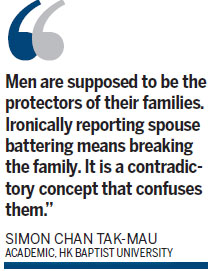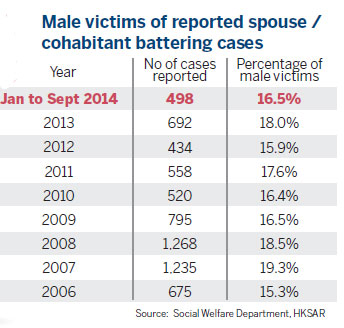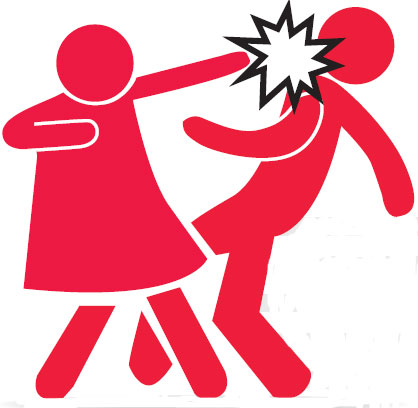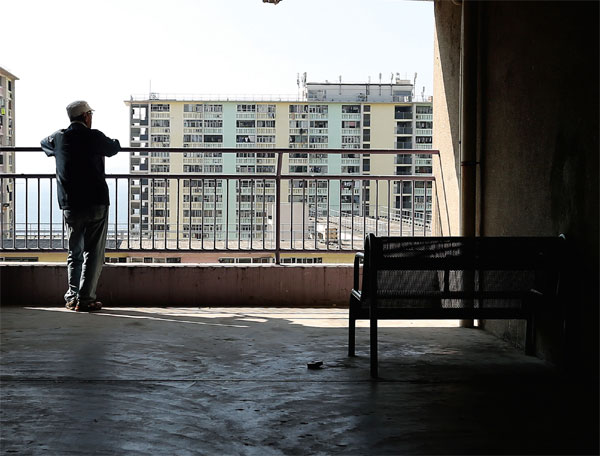Men don't cry
Updated: 2014-11-25 07:31
By Ming Yeung(HK Edition)
|
|||||||||
Battered husbands may not be such a rarity as we tend to think. Ming Yeung turns the spotlight on the plight of men who often find it harder to deal with shame, guilt and isolation that physical assault invariably leads to.
It was after 10 pm, the end of a long day. Benny Hon had been sitting at the wheel of his taxi for more than 14 hours. It was Nov 17 - the day Hon turned 62 and nobody cared. He would "celebrate" by sitting in his taxi, telling his bizarre story to China Daily.
Hon had been alone for 13 years - longer, really. He was divorced 13 years ago, but really was left alone the day a female stranger called, and told him his wife had been having an affair with another man for eight years.
"The woman was the man's girlfriend. My ex-wife forced her to leave him," Hon said. His tone was flat, matter-of-fact, as if none of this involved him. Not hard to understand. He and his wife had stopped communicating for years even before that, unless he counted when she humiliated him in front of others, spat on him, beat him up.
The marriage started the downhill run, soon after they were married. She wanted control of everything, even the money he brought home - which was never enough to keep her quiet. By the time their daughter was born, Hon was driving night shift, trying to increase his income. His wife was complaining she felt neglected. Then it got worse.
"At first, she would humiliate me verbally. I was useless because I couldn't fix appliances. She slapped me in front of her relatives - out of nothing," he recalled. "She only used me to release her anger."
Hon never saw her on weekends. She was never around on public holidays either. Hon took it all.
After their daughter was born, Hon said, his wife's behavior grew more bizarre -- she would fly into rages, beat her head against the wall and then hit him with whatever came within reach.
"She spat in my face and didn't allow me to wipe it off," Hon recalled, his voice falling away. His wife took away his self-esteem and he never struck back.
Hon is a battered husband - one of a very select group for the likes of whom there's not much support out there in the community. People don't take them seriously, says Lai Wai-lun, supervisor at the Caritas Personal Growth Centre for Men.
Alarming figures
Social Welfare Department (SWD) statistics reveal 2,044 new cases of battering during the first half of 2014, among which 16.2 percent of the victims were men - nearly one in six. Last year there were 692 cases of family violence involving male victims - a 60 percent increase over 434 complaints from male victims in 2012.
The situation is getting worse, said Lai. Abusers are anxious people, trying to compensate for their own feelings of inadequacy. Many of these people are afraid that if they don't take full control of their situation they will become abandoned, alone and unloved themselves. So, they seize total control, suck the life out of their partner - destroy their victim's self-respect.
The male victims, Lai continued, come from different social strata, different levels of education. Many male victims consider assaulting a woman, even in retaliation, unacceptable. They believe conflicts can be resolved rationally and without resort to violence. "For various reasons, they choose to step back and remain silent but enduring may not be a workable solution," he said.
Yeung Ka-ching, principal lecturer at the Department of Social Work and Social Administration at the University of Hong Kong, described the majority of his clients as people in need of family counseling. He's dealt with 20 cases this year, three of them involving men, battered by women.
Simon Chan Tak-mau, assistant professor at the Department of Social Work at Hong Kong Baptist University, said battered men overturn public perceptions about domestic abuse, and challenge the conventional dogma that all violent spouses are men.
Expectedly, very few men report cases of being physically abused by a spouse. "I'm much taller and much stronger than my wife. I don't know what my friends would think of me if I told them the truth," Benny Hon says. He confessed that the shame and the strain of having nobody to talk to had given rise to thoughts of suicide.
Even if they have serious injuries, they won't say they were hit by their wives. They will say they tripped or they had an accident, Chan said. This long-perceived social ideology that stereotypes masculinity also re-victimizes battered men who become stranded in their situation, he acknowledged.
"Men are taught to be courageous. They are supposed to be the protectors of their families. Ironically reporting spouse battering means breaking the family. It is a contradictory concept that confuses them," Chan noted.
Cross-border discord
The increased financial contribution of women has empowered them at home and changed the power dynamic between spouses. Cross-border marriages could also be a factor.
"The heyday of cross-border marriages was 15 years ago when many middle-aged Hong Kong men went across the border to look for much younger brides. Today these men are getting frail while their wives are in their golden years. The power has shifted from the men to the women," Chan said.
Female abusers are often motivated by jealousy and disappointment, as opposed to men losing control on their emotions because of stress or a possible drinking problem. "Women often feel there is no communication between them and their husbands, which makes them unhappy and angry. Overwhelming anger can generate an outburst of violence," Yeung said.
Male victims of abuse often tend to blame themselves for the problem. One of Chan's clients, a vice-principal at a primary school in Tai Po, lost his job when the school was closed down. His wife became the sole bread-earner, and subsequently began beating the husband to release stress. The man believed he deserved the battering, refusing to blame his wife.
Children of battered men often look down on fathers for not being "strong" enough. The psychological effect on battered men may be irreversible, especially when they are spurned by both wife and children, Chan said.
Women who have better language skills often get the better of men in verbal altercations, Lai Wai-lun pointed out. "Verbal expression, often peppered with foul language, serves as a powerful weapon. Women start to think if I can beat you with my words, why not fists?"
A SWD spokesman said the department has set up 11 Family and Child Protective Services Units, specialized to handle problems of spousal/cohabitant battering. "When taking referrals from the police or others, designated social workers will contact the victims (including male victims) and provide outreach and crisis intervention services to minimize trauma to victims and their family members."
"To help domestic violence victims lacking motivation to seek assistance, SWD has launched the Family Support Program in Integrated Family Service Centres and Medical Social Service Units since 2007," the spokesman added.
Men don't seek help
Lai Wai-lun dismissed the centers as having little practical value for male victims. Men don't seek help. NGOs usually organize activities for men, in hopes of getting acquainted, hoping the men will open up and talk about their problems.
Since the 1990s, Lai said, only 15-20 percent of Caritas' service seekers have been men. "By organizing group activities for men, male victims may realize theirs is not the worst case or that they are not alone," Lai explained. "SWD tends to de-genderize social issues. In other words, they do not provide support for this particular group of needy men. From our experience, there is a trend and the government should put more resources into dealing with it."
Simon Chan says there is no assistance manual on how to help abused men. "They (social workers) are trained to protect the weak. But the weak do not include males," he said. Due to the sensitivity of the issue, helping professionals are urged to be flexible when dealing with male victims, who usually do not address their problems directly.
Thirteen years have passed since Benny Hon's divorce but the scars remain. The night before he signed the divorce document, his ex-wife asked if he would still take her back if she continued to have extra-marital affairs. He said yes.
The physical assaults he endured are not the source of his deepest hurt. The pain goes deeper still when he thinks of his daughter, who took her mother's side.
A phone call interrupted Hon's painful reflections. "Oh! You remembered? Thanks very much. Let's meet for dinner soon." He sounded cheery and smiled. Someone had remembered his birthday. For a moment Hon felt happy again.
That was all. He was going home to his flat where he lives alone - as he sees himself, a man "forgotten by society".
Contact the writer at mingyeung@chinadailyhk.com




(HK Edition 11/25/2014 page7)